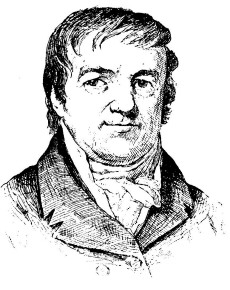John Jacob Astor
|
|
John Jacob (originally Johann Jakob) Astor (July 17, 1763 - March 29, 1848) made a fortune in fur trading and real estate. He is the founder of what became known as the Astor family.
Born in Walldorf, Baden, Germany (currently in the Rhein-Neckar district), his father was a butcher, and he learned English in London while working for his brother, George whose business was manufacturing musical instruments.
Astor arrived in the United States in March 1784 just after the end of the Revolutionary War. He started a fur goods shop in New York City in the late 1780s.
Astor took advantage of the Jay's Treaty between Great Britain and the United States in 1794 which opened new markets in Canada and the Great Lakes region at the expense of the Canadians. By 1800 he had amassed nearly a quarter of a million dollars, and had become one of the leading figures in the fur trade. In 1800 Astor followed the example of the Empress of China, the first American trading vessel to China, and started to trade furs, teas and sandalwood with Canton in China. He used the opportunity, that American merchants did not need a permission to trade in ports monopolized by the British East India Company after the Revolutionary War. He greatly benefited from the fur trade with China. But the Embargo Act from Thomas Jefferson in 1807 disrupted his import/export business. Therefore he established with the permission of President Jefferson the American Fur Company on April 6, 1808, and later formed subsidiaries, the Pacific Fur Company and the Southwest Fur Company (in which Canadians had a part) to control fur trading in the Columbia River and Great Lakes area respectively. His fur trading ventures were disrupted when the British captured his trading posts during the War of 1812. However, his operations rebounded in 1817 after the US Congress passed a protectionist law that barred foreign traders from U.S. Territories. The American Fur Company once again came to dominate trading in the area around the Great Lakes. In 1822, Astor established the Astor House on Mackinac Island as headquarters for the reformed American Fur Company, making the island a metropolis of the fur trade. Astor withdrew from the company in 1834.
A lengthy description based on documents, diaries etc. was given by Washington Irving in his travelogue Astoria.
As the cost of fur went up due to over trapping, and the demand went down due to changing fashions, Astor turned his sights on New York City real estate. He retired from business in 1834 and spent the rest of his life as a patron of culture. He supported the famous ornithologist John James Audubon, Edgar Allan Poe, the presidential campaign of Henry Clay. Furthermore he was the founder of the first hotel which belonged to the Astor family, the Astor House. In his last will he gave orders to built the Astor Library for the New York public and to build a poorhouse in his German hometown Walldorf. At the time of his death, Astor was the wealthiest person in the United States, leaving an estate estimated to be worth 20 million dollars or more. He is interred in the Trinity Churchyard Cemetery on the 155th street in Manhattan, New York.
The great bulk of his fortune was bequeathed to his second son, William Backhouse Astor Sr., instead of his eldest son John Jacob Astor II (1791-1869). A part of his money also went to found the Astor Library which was later consolidated with other libraries to form the New York Public Library.
Children
- Magdalen (1788-1832)
- Sarah (1790-1791)
- John Jacob II (1791-1869)
- William Backhouse (1792-1875)
- Dorothee (1795-1853)
- Henry (1797-1799)
- Eliza (1801-1838)
- unnamed son (1802)

